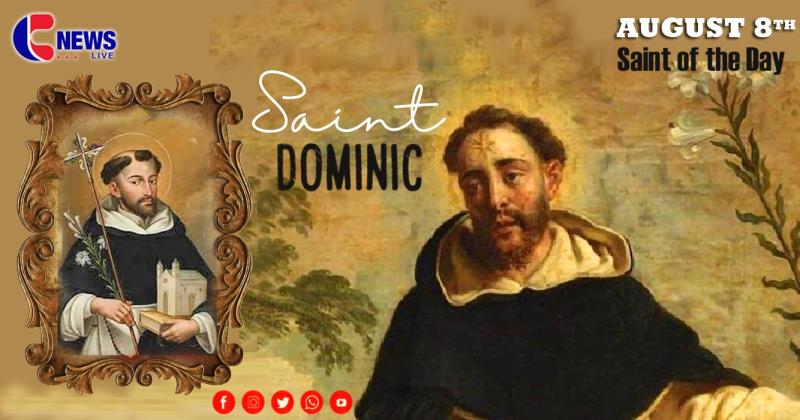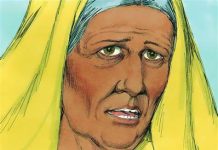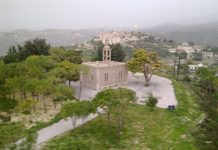القديس دومنيك مؤسس الرهبنة الدومينيكانية وشفيع الفلكيين
الياس بجاني/08 آب/2025
الاسم الكامل: دومنيك دي غوزمان
تاريخ الولادة: حوالي سنة 1170
مكان الولادة: كالديرويغا، مملكة قشتالة (إسبانيا حاليًا)
تاريخ الوفاة: 6 آب / أغسطس 1221، بولونيا، إيطاليا
إعلان القداسة: 13 تموز / يوليو 1234، على يد البابا غريغوريوس التاسع
عيده الكنسي: 8 آب / أغسطس
شفيع: الفلكيين، جمهورية الدومينيكان، العلماء، والأساتذة
نشأته وتعليمه
ولد دومنيك في عائلة نبيلة، وكان والده “فيليكس دي غوزمان” رجلًا وجيهًا، ووالدته “الطوباوية خوانا دي أزا” امرأة مشهورة بالتقوى والكرم. وتروي التقاليد أن والدته رأت في الحلم كلبًا يخرج من بطنها يحمل شعلة مشتعلة في فمه، في إشارة رمزية إلى أن ابنها سيُنير العالم بكلمة الله.
تلقّى دومنيك تعليمًا كلاسيكيًا متقدمًا في مدينة بالينثيا الإسبانية، حيث درس الفنون الحرة واللاهوت، وبرز بتفوّقه الأكاديمي وورعه الديني. وخلال فترة مجاعة كبيرة ضربت البلاد، باع كتبه الثمينة لإطعام الجياع، قائلاً:
“هل أدرس على جلود ميتة بينما يموت الناس من الجوع؟”
الكهنوت والخدمة الأولى
في سنة 1196، انضم دومنيك إلى جماعة الكاتدرائية في أوسما ورُسِم كاهنًا. رافق أسقفه “دييغو دي آسيبو” في رحلات دبلوماسية وتبشيرية، بما في ذلك رحلة إلى جنوب فرنسا سنة 1206. وهناك، صُدم دومنيك بتفشّي بدعة الألبيجنسيين (الكاتاريين)، وهم جماعة أنكرت الأسرار الكنسية ورفضت المادة واعتبرت العالم شرًا.
ومنذ ذلك الوقت، كرّس دومنيك حياته لمواجهة هذه البدعة، ليس بالسلاح، بل من خلال التعليم والوعظ والنقاش اللاهوتي، مقتديًا بحياة الرسل، فاعتمد الفقر والبساطة وسيلة لجذب القلوب إلى الحق.
تأسيس رهبنة الدومينيكان
في عام 1215، وخلال إقامته في مدينة تولوز الفرنسية، أسّس دومنيك جماعة من الوعّاظ كانوا يعيشون حياة مشتركة تقوم على الصلاة والتعلّم والتبشير.
سافر إلى روما سنة 1216 لطلب الاعتراف الرسمي من البابا بالرهبنة الجديدة. وفي 22 كانون الأول/ديسمبر 1216، أصدر البابا هونوريوس الثالث مرسومًا يعترف فيه رسميًا بـ “رهبنة الواعظين” (Ordo Praedicatorum)، والتي عُرفت لاحقًا باسم الرهبنة الدومينيكانية.
أبرز خصائص الرهبنة:
الغاية: التبشير بالإنجيل ومحاربة البدع بالوعظ والتعليم.
النهج: مزيج من الحياة الرهبانية والانخراط في العالم عبر الوعظ والتعليم.
النذور: الفقر، الطهارة، والطاعة.
الشعار: الحقيقة (Veritas).
أولى دومنيك أهمية كبرى للتعليم، فأسّس مدارس لاهوتية وأرسل إخوته إلى جامعات كبرى مثل باريس وبولونيا، لكي يتسلحوا بالمعرفة في مواجهة الضلالات.
رسالته وإرثه
قضى دومنيك ما تبقى من حياته في تنظيم الرهبنة، وتأسيس الأديرة، وإرسال الإخوة في بعثات تبشيرية عبر أوروبا. ومن أبرز صفاته:
التواضع والرحمة.
قضاء ليالٍ طويلة في الصلاة والتأمل.
المعجزات التي نُسبت إليه، كالأشفية والنبؤات.
نشر عبادة المسبحة الوردية، إذ تنقل بعض التقاليد أن العذراء مريم سلّمته المسبحة كأداة روحية لمحاربة الهرطقات. ورغم أن هذه القصة ليست مثبتة تاريخيًا، فقد أصبحت من الركائز الروحية للدومينيكان.
توفي دومنيك في 6 آب / أغسطس 1221 في بولونيا، منهكًا من الجهد والسفر، وكان محاطًا بإخوته.
تأثيره عبر التاريخ
أسّس دومنيك رهبنة كان لها دور كبير في الكنيسة الكاثوليكية طوال القرون التالية. ومن أبرز الشخصيات التي خرجت من هذه الرهبنة:
القديس توما الأكويني: أحد أعظم اللاهوتيين والفلاسفة في تاريخ المسيحية.
القديسة كاترينا السيانية: صوفية ومصلحة ولقّبت بدكتورة الكنيسة.
بارتولومي دي لاس كاساس: مدافع عن حقوق السكان الأصليين في القارة الأميركية.
لعب الدومينيكان دورًا أساسيًا في:
تطوير الجامعات والتعليم اللاهوتي.
محاربة الهرطقات (ومن ضمنها دورهم لاحقًا في محاكم التفتيش).
العمل التبشيري في آسيا والأميركتين.
الدفاع الفكري والمنطقي عن الإيمان الكاثوليكي.
حتى اليوم، يواصل الرهبان الدومينيكان رسالتهم في التبشير والتعليم والخدمة الرعوية في كل أنحاء العالم.
الإرث الروحي
يمثل القديس دومنيك نموذجًا في:
الحماسة الإنجيلية.
تكامل الإيمان والعقل.
الفقر الإنجيلي والاتكال على العناية الإلهية.
محبة الحقيقة وخدمة النفوس.
ومن أبرز العبارات المنسوبة إليه:
“يجب أن نتحدث فقط مع الله أو عن الله.”


















